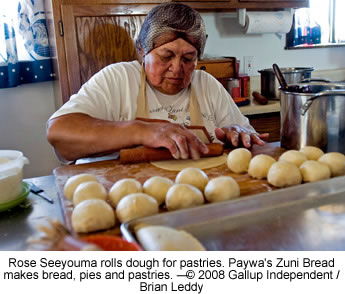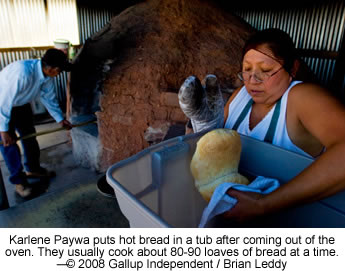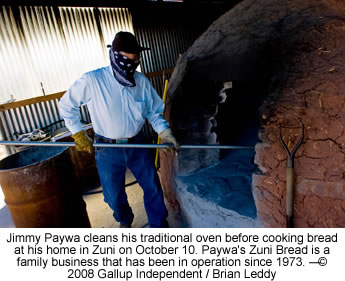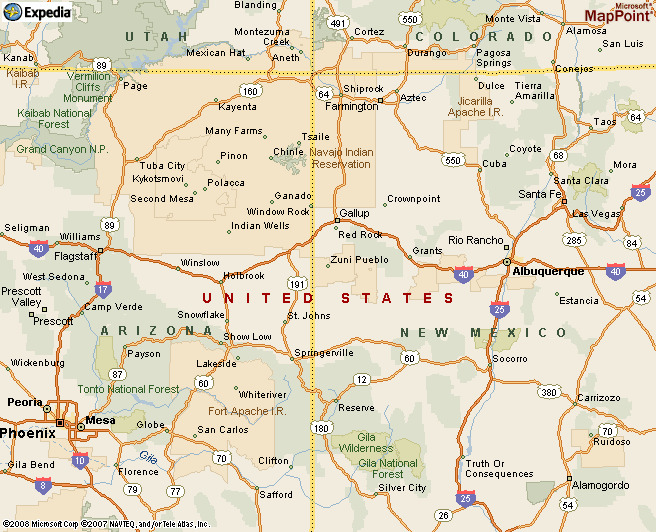 |
Canku Ota
|
 |
|
(Many Paths)
|
||
|
An Online Newsletter
Celebrating Native America
|
||
|
December 1, 2008 - Volume
6 Number 3
|
||
|
|
||
|
Baking the Bread
Zuni family keeps business going since 1973 |
||
|
by Elizabeth Hardin-Burrola
- Gallup Independent Staff writer - November 3, 2008
|
||
|
credits: photos by Brian
Leddy - Gallup (NM) Independent
|
|
Zuni Pueblo, New Mexico
Along with freshly baked Zuni bread, they are probably looking for something more — a unique tourist stop, information about a centuries-old tradition, or a personal glimpse into a Native American home. They get all of those things when they stop by the Paywa’s house, where they can see the largest bread oven in Zuni Pueblo, they can learn about the Zuni tradition of bread making, and they can purchase bread, fruit pies, and turnovers from the family home. Family
affair According to the family, the business was started in the 1970s by Jimmy and Rose’s parents, Bowman and Louise Paywa, who called it B&L Zuni Bread. Thirty years later, Jimmy, who once ran his own machine shop; Rose, who retired from a long career at the Leupp Boarding School; and Karlene, who used to work at the Gallup Head Start, are carrying on a family business rooted in Zuni tradition. “It’s a lot of hard work, but you get to meet a lot of people,” Jimmy Paywa said.
According to the family, they take two vacations a year during times of religious ceremonies in Zuni Pueblo. One work break is in June, they said, and the other is in December, right after Shalako. The rest of the year, the family sells about 180 loaves of traditional Zuni sourdough bread each week, along with 80 loaves of yeast bread and 24 loaves of raisin bread. The women fashion the sourdough and yeast bread into one of two styles: “flip-over,” where the dough is folded over like a taco, and “fancy,” where the dough is cut, which forms horn-like shapes. Seeyouma said the fancy style is the traditional Zuni bread style. “It’s always been made like that,” Seeyouma said when asked about the unique shape. Zuni people call it “bread with the horns,” she said, while Navajo customers call it “bear claw” bread. In contrast, Seeyouma explained, the people of Acoma Pueblo shape their bread into big round loaves. “We call them a big hamburger bun,” she joked. The family also makes and sells about 16 fruit pies and nearly 100 turnovers each week. Seeyouma regularly mixes up apple, peach, cherry, and pineapple filling, and sometimes apricot and blueberry.
The beehive-shaped outdoor ovens, which were introduced into pueblo culture when the Spanish introduced wheat into the American Southwest, attract a lot of attention regardless of their size. According to the Paywa family, tourists who have some knowledge of Native American culture sometimes think the ovens are the Zuni version of a Navajo sweat lodge, while other tourists think the ovens are Zuni dog houses. Although amused by such comments, the family members said they enjoy meeting new visitors. Karlene Paywa said the family ends up in a lot of photographs taken by tourists and visiting school teachers. Two years ago, they also ended up in a rodeo television program after a film crew — shooting a junior rodeo in Gallup — took a side trip to Zuni and ended up at the Paywa’s house. Rodeo fans shopping at the Gallup Flea Market later told Jimmy Paywa they had seen the family on television. Some of their visitors keep in touch and send them postcards, letters, and even some gifts. A customer from Texas mailed the family gifts of jam and pecans, and a French woman sent them a postcard featuring a photograph of France’s famous bread — crepes. But non-Indian tourists aren’t the only customers of Paywa’s Zuni Bread. Members of other tribes will frequently stop by, particularly Navajo families needing bread for family gatherings, weddings, and funerals. “We even have Apache people clear from Arizona,” said Seeyouma. Other Zuni people are also frequent customers. Not all Zuni families have their own bread ovens, the family members explained, and those who do have ovens don’t necessarily bake their own bread on a regular basis. The Paywas and Seeyouma agreed that although the business involves a lot of work, it gives them time to spend together. Karlene Paywa explained that she grew up helping her grandparents when they ran B&L Zuni Bread, and she now enjoys working with her father and aunt. “I guess it brings back memories of my grandparents,” she said. Information: Paywa’s Zuni Bread at (505) 782-4849 |
|
|
www.expedia.com |
|
|
||
|
|
||
| Canku Ota is a free Newsletter celebrating Native America, its traditions and accomplishments . We do not provide subscriber or visitor names to anyone. Some articles presented in Canku Ota may contain copyright material. We have received appropriate permissions for republishing any articles. Material appearing here is distributed without profit or monetary gain to those who have expressed an interest. This is in accordance with Title 17 U.S.C. Section 107. | ||
|
Canku Ota is a copyright ©
2000, 2001, 2002, 2003, 2004, 2005, 2006, 2007, 2008 of Vicki Barry
and Paul Barry.
|
||
 |
 |
|
|
The "Canku
Ota - A Newsletter Celebrating Native America" web site and
its design is the
|
||
|
Copyright ©
1999, 2000, 2001, 2002, 2003, 2004, 2005,
2006, 2007, 2008 of Paul C.
Barry.
|
||
|
All Rights Reserved.
|
||
 On
any given week, tourists from around the world may knock at the
front door of the Paywa home in Zuni Pueblo.
On
any given week, tourists from around the world may knock at the
front door of the Paywa home in Zuni Pueblo.  Three
days a week the family members work from about 7 a.m. to 4 p.m.,
preparing and selling their bread, pies, and turnovers. Jimmy Paywa
oversees the outdoor oven and everything that goes with it —
chopping the firewood, heating and cleaning the oven, loading and
unloading the bread and pies. Seeyouma, a lifelong baker, oversees
the kitchen work by preparing the dough, pie crusts, and fruit filling.
Karlene Paywa helps both her father and her aunt by kneading and
weighing dough, making turnovers, helping load and unload the oven,
wrapping the baked items, and waiting on customers. On Saturday,
Jimmy Paywa sells the baked goods at the Gallup Flea Market, while
Seeyouma sells in front of the Zuni tribal building. On Sundays,
Karlene Paywa and her husband haul more firewood for the next week.
Three
days a week the family members work from about 7 a.m. to 4 p.m.,
preparing and selling their bread, pies, and turnovers. Jimmy Paywa
oversees the outdoor oven and everything that goes with it —
chopping the firewood, heating and cleaning the oven, loading and
unloading the bread and pies. Seeyouma, a lifelong baker, oversees
the kitchen work by preparing the dough, pie crusts, and fruit filling.
Karlene Paywa helps both her father and her aunt by kneading and
weighing dough, making turnovers, helping load and unload the oven,
wrapping the baked items, and waiting on customers. On Saturday,
Jimmy Paywa sells the baked goods at the Gallup Flea Market, while
Seeyouma sells in front of the Zuni tribal building. On Sundays,
Karlene Paywa and her husband haul more firewood for the next week. Worldwide
customers
Worldwide
customers